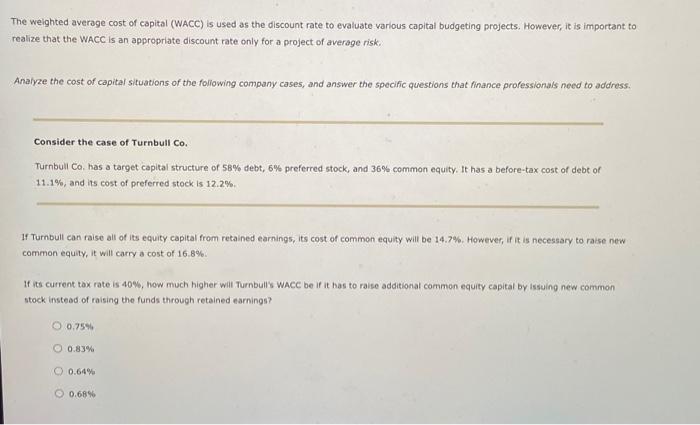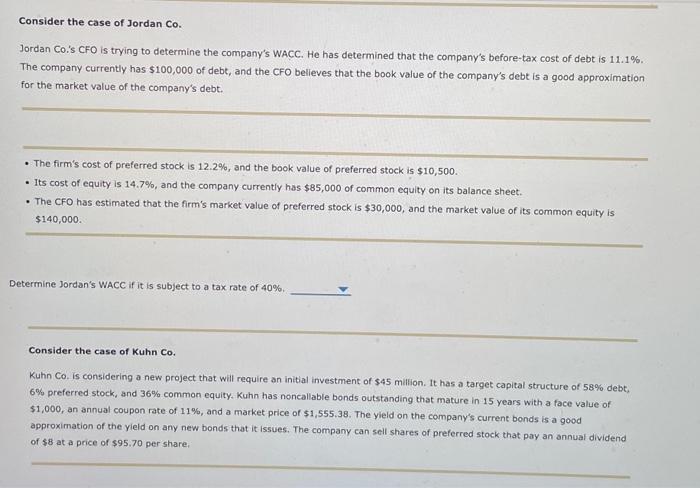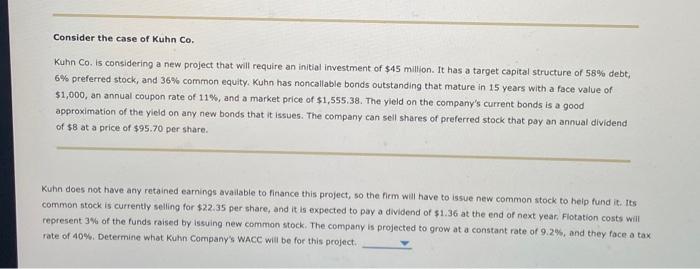Answered step by step
Verified Expert Solution
Question
1 Approved Answer
please explain how each step was solved, thanks The weighted average cost of capital (WACC) is used as the discount rate to evaluate various capital
please explain how each step was solved, thanks 


The weighted average cost of capital (WACC) is used as the discount rate to evaluate various capital budgeting projects. However, it is important to realize that the WACC is an appropriate discount rate only for a project of average risk. Analyze the cost of capital situations of the following company cases, and answer the specific questions that finance professionals need to address. Consider the case of Turnbull Co. Turnbull Co. has a target capital structure of 58% debt, 6% preferred stock, and 36 % common equity. It has a before-tax cost of debt of 11.1%, and its cost of preferred stock is 12.2%. If Turnbull can raise all of its equity capital from retained earnings, its cost of common equity will be 14.7%. However, if it is necessary to raise new common equity, it will carry a cost of 16.8%. If its current tax rate is 40%, how much higher will Turnbull's WACC be if it has to raise additional common equity capital by Issuing new common stock instead of raising the funds through retained earnings? O 0.75% 0.83% 0.64% 0.68% Consider the case of Jordan Co. Jordan Co.'s CFO is trying to determine the company's WACC. He has determined that the company's before-tax cost of debt is 11.1%. The company currently has $100,000 of debt, and the CFO believes that the book value of the company's debt is a good approximation for the market value of the company's debt. . The firm's cost of preferred stock is 12.2%, and the book value of preferred stock is $10,500. Its cost of equity is 14.7%, and the company currently has $85,000 of common equity on its balance sheet. The CFO has estimated that the firm's market value of preferred stock is $30,000, and the market value of its common equity is $140,000. Determine Jordan's WACC if it is subject to a tax rate of 40%. Consider the case of Kuhn Co. Kuhn Co. is considering a new project that will require an initial investment of $45 million. It has a target capital structure of 58% debt, 6% preferred stock, and 36% common equity. Kuhn has noncallable bonds outstanding that mature in 15 years with a face value of $1,000, an annual coupon rate of 11%, and a market price of $1,555.38. The yield on the company's current bonds is a good approximation of the yield on any new bonds that it issues. The company can sell shares of preferred stock that pay an annual dividend of $8 at a price of $95.70 per share. Consider the case of Kuhn Co. Kuhn Co. is considering a new project that will require an initial investment of $45 million. It has a target capital structure of 58% debt, 6% preferred stock, and 36% common equity. Kuhn has noncallable bonds outstanding that mature in 15 years with a face value of $1,000, an annual coupon rate of 11%, and a market price of $1,555.38. The yield on the company's current bonds is a good approximation of the yield on any new bonds that it issues. The company can sell shares of preferred stock that pay an annual dividend of $8 at a price of $95.70 per share. Kuhn does not have any retained earnings available to finance this project, so the firm will have to issue new common stock to help fund it. Its common stock is currently selling for $22.35 per share, and it is expected to pay a dividend of $1.36 at the end of next year. Flotation costs will represent 3% of the funds raised by issuing new common stock. The company is projected to grow at a constant rate of 9.2%, and they face a taxi rate of 40%. Determine what Kuhn Company's WACC will be for this project 


Step by Step Solution
There are 3 Steps involved in it
Step: 1

Get Instant Access to Expert-Tailored Solutions
See step-by-step solutions with expert insights and AI powered tools for academic success
Step: 2

Step: 3

Ace Your Homework with AI
Get the answers you need in no time with our AI-driven, step-by-step assistance
Get Started


